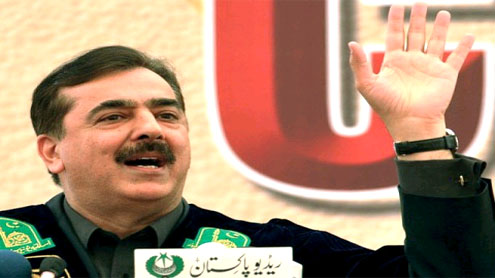 On Sunday, the intelligence agencies’ controversial role in the country’s affairs received attention from diverse sources. Prime Minister Yousaf Raza Gilani, while interacting with journalists in Lahore, in answer to a question said the ISI was an important national institution but should not be controversial.
On Sunday, the intelligence agencies’ controversial role in the country’s affairs received attention from diverse sources. Prime Minister Yousaf Raza Gilani, while interacting with journalists in Lahore, in answer to a question said the ISI was an important national institution but should not be controversial.
About the possible closure of the political wing of the ISI, considered the part of the agency most involved with interference in the politics of the country, the prime minister said he had not yet had time to speak to the new DG ISI on the matter. We would urge the prime minister to do just that at the first opportunity, since it is obvious that the powerful agency needs to be taken on board if the objective of regulating its activities is to be achieved. Meanwhile, as a consequence of the Mehrangate case, Altaf Hussain, leader of the MQM, reasserted from London that he had refused to accept money offered by the ISI.
If true, it means that Altaf Hussain’s suspected links with the intelligence agencies of the country when he first embarked on his political career have since been overtaken by time and developments. In any case, politicians have to realise that such links have not helped them or the democratic system to find its desired level. Also in London, Nawaz Sharif expressed the hope that COAS General Kayani will ensure that the new DG ISI, Lt General Zaheerul Islam would refrain from meddling in the country’s affairs to ‘engineer’ the political course.
Nawaz Sharif accused the PPP-led government of currying favour with the establishment for the sake of clinging to power and said his party would never become part of the conspiracies hatched by the intelligence agencies to ‘manage’ politics. He went on to add that the role of the spy agencies should not be to take over the offices of political parties and indulge in horse-trading as they did during Musharraf’s rule to help the PML-Q. The reference here is to the forcible takeover of Muslim League House in Lahore and the creation of the PML-Q from the bulk of the PML-N in the aftermath of Musharraf’s coup in 1999.
Here too, if Nawaz Sharif, as he claims, has realised the mistakes he made in the past and has learnt his lesson, another protégé of the establishment has seemingly broken ranks with the intelligence agencies-driven manipulation of politics. Nawaz believes the reason why his party is considered anti-establishment is because he has steadfastly refused (since returning from forced exile) to be party to the games the establishment and its intelligence arms constantly play.
A credible addition to the concerns expressed by these diverse political leaders across the political divide was the Human Rights Commission of Pakistan’s (HRCP’s) statement at the end of its annual general meeting that it was time to improve vigilance against any form of extra-democratic intervention in the forthcoming general elections by the military, extremists or any special judicial process.
Stress was laid during the proceedings on the issue of forced disappearances and the government’s lack of action in this regard, expressing the HRCP’s indignation that nearly a decade after the menace of forced disappearances raised its ugly head, not a single person has been held to account for involvement in this travesty of human rights and the law.
HRCP called for the government’s acknowledgement of all such illegal detentions, release of the detainees and to put in place means to ensure that disappearances become a thing of the past. Compensation must be offered to the victims and due process ensured for the considerable number of people known to be in military detention after the military’s operations. Last but not least, the HRCP asked for respect for the consensus that there is a need to regulate the working of the intelligence agencies through legislation.
While the need for legislation and setting out of the rules governing the role of the intelligence agencies is undeniable, perhaps some institutional arrangements are also the need of the hour. In developed democracies, the intelligence agencies are controlled through parliamentary oversight. Something similar needs to be created here to ensure the dreaded ‘deep state’ is reined in from violating its appropriate purview. – Dailytimes












